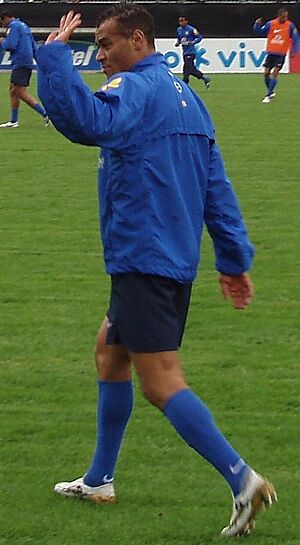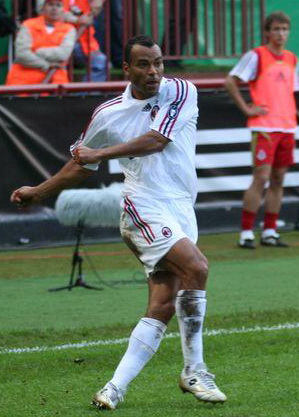Cafu facts for kids
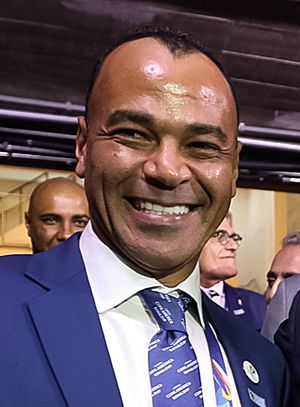
Cafu at the 2019 Copa América
|
||||||||||||||||||||||||||||||||||||||||
| Personal information | ||||||||||||||||||||||||||||||||||||||||
|---|---|---|---|---|---|---|---|---|---|---|---|---|---|---|---|---|---|---|---|---|---|---|---|---|---|---|---|---|---|---|---|---|---|---|---|---|---|---|---|---|
| Full name | Marcos Evangelista de Morais | |||||||||||||||||||||||||||||||||||||||
| Date of birth | 7 June 1970 | |||||||||||||||||||||||||||||||||||||||
| Place of birth | Itaquaquecetuba, São Paulo, Brazil | |||||||||||||||||||||||||||||||||||||||
| Height | 1.76 m (5 ft 9 in) | |||||||||||||||||||||||||||||||||||||||
| Position(s) | Right-back | |||||||||||||||||||||||||||||||||||||||
| Youth career | ||||||||||||||||||||||||||||||||||||||||
| Portuguesa | ||||||||||||||||||||||||||||||||||||||||
| Juventus-SP | ||||||||||||||||||||||||||||||||||||||||
| 1988–1990 | São Paulo | |||||||||||||||||||||||||||||||||||||||
| Senior career* | ||||||||||||||||||||||||||||||||||||||||
| Years | Team | Apps | (Gls) | |||||||||||||||||||||||||||||||||||||
| 1989–1995 | São Paulo | 216 | (33) | |||||||||||||||||||||||||||||||||||||
| 1995 | Zaragoza | 16 | (0) | |||||||||||||||||||||||||||||||||||||
| 1995 | Juventude | 2 | (0) | |||||||||||||||||||||||||||||||||||||
| 1995–1997 | Palmeiras | 41 | (2) | |||||||||||||||||||||||||||||||||||||
| 1997–2003 | Roma | 163 | (5) | |||||||||||||||||||||||||||||||||||||
| 2003–2008 | AC Milan | 119 | (4) | |||||||||||||||||||||||||||||||||||||
| Total | 557 | (44) | ||||||||||||||||||||||||||||||||||||||
| International career | ||||||||||||||||||||||||||||||||||||||||
| 1990–2006 | Brazil | 142 | (5) | |||||||||||||||||||||||||||||||||||||
|
Medal record
|
||||||||||||||||||||||||||||||||||||||||
| *Club domestic league appearances and goals | ||||||||||||||||||||||||||||||||||||||||
Marcos Evangelista de Morais (born on June 7, 1970), known as Cafu, is a Brazilian former professional footballer. He played as a right-back. Many people think he is one of the best right-backs ever. He was known for his speed and powerful runs down the right side of the field. He is the player with the most games for the Brazil national team, with 142 appearances.
At club level, Cafu won many championships in Brazil, Spain, and Italy. He is best known for his time at São Paulo (1989–1995), Roma (1997–2003), and AC Milan (2003–08). He also played briefly for Zaragoza, Juventude, and Palmeiras. In 1994, Cafu was named the South American Footballer of the Year. In 2004, the famous player Pelé chose him for the FIFA 100 list of the world's greatest living players. He was also part of the FIFPro World XI in 2005. In 2020, he was included in the Ballon d'Or Dream Team.
Cafu played for Brazil in four FIFA World Cups between 1994 and 2006. He is the only player ever to play in three World Cup finals. He won the World Cup in 1994 and 2002. In 2002, he was the team captain and lifted the World Cup trophy! With Brazil, he also played in four Copa América tournaments. He won the title twice, in 1997 and 1999. He also won the 1997 FIFA Confederations Cup with his national team.
Contents
Cafu's Early Life
Cafu grew up in a poor neighborhood called Jardim Irene in São Paulo. He was one of six children. When he was seven, he joined a football academy. He then moved to junior teams like Nacional-SP and Portuguesa. He also played futsal for two years.
As a child, he got the nickname 'Cafu'. This was in honor of another Brazilian player named Cafuringa.
In the early 1980s, many youth teams did not pick him. These included Corinthians and Palmeiras. But in 1988, he joined the youth team of his hometown club, São Paulo. That year, he won the Copa São Paulo youth tournament.
Playing for Clubs
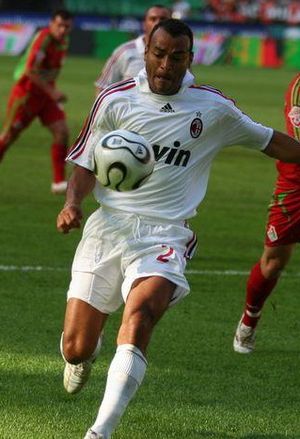
At São Paulo, youth coach Telê Santana became Cafu's mentor. He told Cafu to change from playing in midfield to playing as a wingback. Cafu learned this new position easily. He quickly became a regular player for the first team. São Paulo won the Copa Libertadores and Intercontinental Cup in 1992 and 1993. In 1994, he was named the South American Footballer of the Year.
In the middle of the 1994–95 season, Cafu joined the Spanish team Real Zaragoza. He won the 1995 Cup Winners' Cup with them. He then went back to Brazil to play for Juventude.
After a short time back in Brazil with Palmeiras in 1996, Cafu returned to Europe. In 1997, he joined Roma in Italy. He won the Scudetto (Italian league title) in 2001 with Roma. While playing for Roma, he got the nickname Il Pendolino, which means "The Express Train."
In 2003, he moved to AC Milan. With Milan, he won his second Scudetto in 2004. He also won his second Supercoppa Italiana. In 2005, he played in his first UEFA Champions League final. The next season, he played less due to injuries.
Cafu still loved his time at Roma. In 2007, Milan won the Champions League. This was a big win for Cafu. He finally got a Champions League winner's medal.
Cafu signed a new contract in May 2007 to stay with Milan until the end of the 2007–08 season. During this time, he won another UEFA Supercup. He also won his first FIFA Club World Cup. On May 16, 2008, it was announced that Cafu would leave Milan at the end of the season. In his last game for Milan, and his last professional game, he scored a goal. Milan won 4–1 against Udinese.
Cafu is a member of the AC Milan and the Roma Halls of Fame.
Passport Issue
Cafu faced a problem about his Italian passport. Some people thought he used a fake passport. This was to get around rules about how many non-European players could be on Italian teams. However, the Italian Football Federation (FIGC) said Cafu's Italian passport was real. It was given to him by Italian officials. In 2004, Cafu and Roma's club president went to court.
On June 12, 2006, a prosecutor asked for Cafu to be put in prison for nine months. This was because the passport issue came up again. But the very next day, Cafu, his wife, and his agent were found innocent of all charges.
Playing for Brazil
Cafu has played more games for the Brazilian men's team than anyone else. He has 142 appearances. He also played in a record 20 World Cup games. He won two World Cups, in 1994 and 2002. He is the only player to play in three World Cup finals. He also held the record for winning the most matches in World Cups with 15 wins.
He played his first game for Brazil on September 12, 1990. He was a substitute in the 1994 World Cup final against Italy. He came on after another player got injured. After that, Cafu became a regular starter for Brazil. Brazil won the Copa América in 1997 and 1999. They also won the 1997 FIFA Confederations Cup. They reached the 1998 World Cup final.
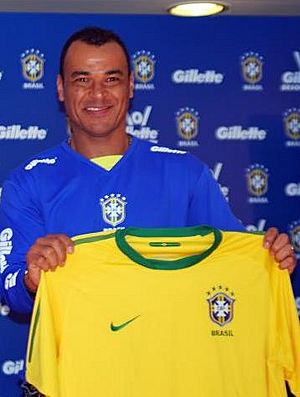
Brazil had a tough time qualifying for the 2002 World Cup. Cafu was criticized by coach Vanderlei Luxemburgo. He lost his captaincy after being sent off in a game. But soon after, a new coach, Luiz Felipe Scolari, took over. The new captain got injured, so Cafu became captain again. Brazil beat Germany 2–0 in the final match. After the game, Cafu lifted the World Cup trophy. He shouted to his wife, "Regina, eu te amo!" ("Regina, I love you!"). Cafu also wrote "100% Jardim Irene" on his shirt to honor where he grew up.
In the 2006 World Cup, Brazil did not do as well. They lost 1–0 to France in the quarter-finals. Coach Carlos Alberto Parreira was criticized for using older players like Cafu (who was 36) instead of younger ones.
How Cafu Played
Cafu is seen as one of the best full-backs ever. He was a very active and strong wing-back on the right side of the field. He was known for his great speed, energy, and smart playing. He was also good at passing the ball and had strong technical skills. He often ran forward to attack down the right side. He would send accurate crosses to his teammates.
Besides his football skills, he was also known for his good behavior and leadership. He was always cheerful. Even though he usually played as an attacking right-back, he could also play as a centre back. This was because he was good at defending. He could also play in more forward positions, like a right winger. In Italy, he was called Pendolino, like the fast trains.
Personal Life
Cafu is separated from his wife Regina Feliciano. They married in 1987. They had three children: two sons (Danilo and Wellington) and a daughter (Michelle). On September 4, 2019, his son Danilo sadly passed away. He had a heart attack while playing football at home.
Honours and Awards
São Paulo
- Campeonato Brasileiro Série A: 1991
- Campeonato Paulista: 1991, 1992
- Copa Libertadores: 1992, 1993
- Supercopa Libertadores: 1993
- Recopa Sudamericana: 1993, 1994
- Intercontinental Cup: 1992, 1993
Real Zaragoza
- UEFA Cup Winners' Cup: 1994–95
Palmeiras
- Campeonato Paulista: 1996
Roma
- Serie A: 2000–01
AC Milan
- Serie A: 2003–04
- Supercoppa Italiana: 2004
- UEFA Champions League: 2006–07
- UEFA Super Cup: 2003, 2007
- FIFA Club World Cup: 2007
- Brazil
- FIFA World Cup: 1994, 2002, runner up: 1998
- Copa América: 1997, 1999
- FIFA Confederations Cup: 1997
Individual Awards
- South American Team of the Year: 1992, 1993, 1994, 1995
- South American Footballer of the Year: 1994
- FIFA World Cup All-Star Team: 2002 (Reserve)
- FIFA 100
- UEFA Team of the Year: 2004, 2005
- FIFPro World XI: 2005
- Sports Illustrated Team of the Decade: 2009
- ESPN World Team of the Decade: 2009
- AS Roma Hall of Fame: 2012
- World Soccer Greatest XI of all time: 2013
- AC Milan Hall of Fame
- World XI: Team of the 21st Century
- Ballon d'Or Dream Team: 2020
- IFFHS All-time Men's Dream Team: 2021
- IFFHS South America Men's Team of All Time: 2021
See also
 In Spanish: Cafú para niños
In Spanish: Cafú para niños
 | John T. Biggers |
 | Thomas Blackshear |
 | Mark Bradford |
 | Beverly Buchanan |


